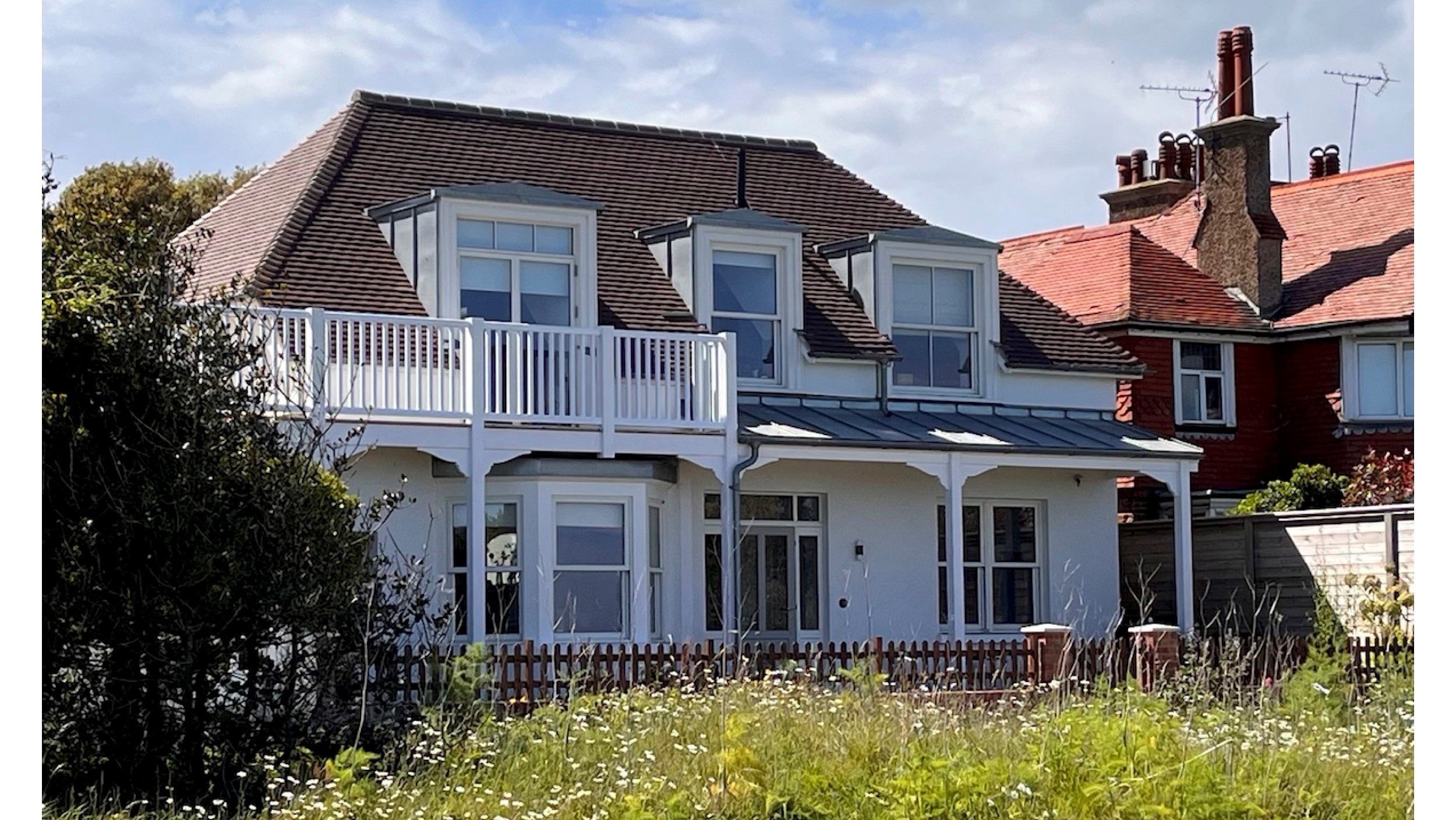
The installation of an external wall insulation on a retrofit near Canterbury, Kent. © Paul Mallion
There is an urgent need to retrofit the UK's ageing, inefficient housing stock to address both the climate emergency and a stark increase in energy poverty – a need recognised by the UK government policy paper Net Zero Strategy 2050: Build Back Greener – and doing so on any meaningful scale will demand technical involvement from trained construction professionals.
As many retrofit projects will necessarily be undertaken directly for private homeowners on limited budgets, it is likely that a single, principal consultant will be appointed rather than a multidisciplinary team.
The individual consultant must therefore have the skills, knowledge and experience necessary to avoid the pitfalls of substandard retrofitting and the endemic performance gap; that is, the difference between designed and actual performance measured after completion.
They must take a holistic view, accounting for the site and situation as well as the property's construction methods and any associated defects.
But with a wide range of professionals now involved in retrofitting, which of them is best positioned to provide such advice? This is after all a technically complex process, as RICS' new Residential retrofit standard describes.
Architects and engineers lack specialism in sustainability
Our experience as building surveyors of attending and running retrofit training courses over the past 20 years, along with a skim through the directories of bodies such as the Association for Environment-Conscious Building (AECB) and the Passivhaus Trust, indicates that retrofit remains largely the preserve of architects.
This is somewhat to be expected, since the architect's traditional remit encompasses the briefing, design, procurement and contract administration processes.
Current architectural training does at least cover sustainability and, encouragingly, the Passivhaus Trust UK provides free training to students on accredited architecture degree courses, and we are suggesting they now include RICS-accredited courses.
Yet the graduates we employ annually from local universities report that sustainability represents only a small proportion of their studies. This may explain why we continually encounter architectural designs that are overglazed, lack solar shading and fail to address key energy efficiency objectives.
Engineers, meanwhile, are a vital part of the retrofit process, and retrofit designers rely on their input. Their focus tends to be highly specific, however. While the engineer is primarily concerned with structure, the retrofit designer will also be considering the fabric as well as other, wider issues.
This difference is not a negative thing in itself, but on domestic retrofits we are still finding engineers who inadvertently compromise energy efficiency. For instance, they may position steelwork in wall cavities, which will result in significant thermal bridging and condensation risk, or they sometimes fail to consider the requirement for thermal breaks.
We should stress that none of this is meant to disparage either architects or engineers; all construction professions have ground to make up when it comes to retrofitting, including surveyors.
Surveyors' skills ideal to lead retrofit work
Given the differences in focus of other professions, there is surely a case for chartered building surveyors to function as lead consultants on retrofit work.
Their particular range of technical knowledge and skill sets mean they are well suited to take charge of such projects. They are trained to understand traditional and modern forms of construction alike, with an added emphasis on building defects and pathology, helping to pre-empt technical failures in what is an emerging field.
In combination with their meticulous, forensic approach, building surveyors also take a holistic view of situations. They consider not just the tangible, immediate aspects of buildings noted previously, but also the wider issues of legal and regulatory matters, ongoing maintenance and durability.
This is crucial to ensure the retrofit project is done right first time – especially since the capital outlay from the client's perspective may be significant.
The surveyor's abilities in contract administration and site inspection are likewise invaluable once the project is on site, as is their quality control function. A scheme may have been rigorously tested and detailed at design stage, but if poor-quality work is carried out or incorrect materials used then the retrofit will be compromised.

The whole retrofit of an Edwardian detached seaside house. © Gavril Postnikov
Professional bodies can promote vital training
Although building surveyors should be undertaking retrofit projects, few are actively engaging in the field. Whereas architects and engineers have realised the need for additional training, Conker's surveyors rarely encounter others from the profession on retrofit or low-energy construction courses that they run or attend.
Everyone is familiar with the need for retrofit, but, without positive encouragement from professional bodies – including RICS – and educational institutions, many will remain uninterested or simply unaware of the career opportunities the field presents.
Surveyors still require additional training to fulfill the roles of retrofit designer and coordinator, though, beyond the essentials covered at degree and APC level; one option is training to become a retrofit coordinator under PAS 2035, the British Standard for retrofitting dwellings.
PAS 2035 is a robust standard and covers a lot of detail that surveyors will already be familiar with, and a chartered surveyor's qualifications count towards training credits to become a retrofit coordinator. However, this standard is actually intended for large-scale public projects rather than private retrofits.
Surveyors should also consider the retrofit training on offer by the following providers:
- the Passivhaus Trust, Passivhaus designer and tradesperson courses
- the AECB, in particular the CarbonLite standard and associated retrofit training
- the Society for the Protection of Ancient Buildings, which regularly runs energy efficiency courses and the Old House Eco Course
- The Alliance for Sustainable Building Products, which runs online training on sustainable materials and products as well as annual awards and the Healthy Buildings Conference & Expo
- the Green Register, which runs courses on retrofit, energy and other topics.
Surveyors must be proactive to fulfil potential
UK construction professionals are all grappling with the practical implications of increasingly stringent energy efficiency requirements for buildings, such as the tightening-up of Conservation of fuel and power: Approved Document L.
All professions have their respective areas of focus and strengths, and each has something to contribute to retrofit projects.
Ultimately, building surveyors have the potential to contribute greatly to the retrofit agenda – but there must be a proactive push towards additional training. Otherwise, the risk is that the surveying profession will fall behind its counterparts, the consequences being that we lose out on a valuable source of work and that we fail to raise the standard of retrofit in the UK.
Paul Mallion FRICS is the owner of Conker Conservation
Contact Paul: Email
Gavril Postnikov is a building surveyor at Conker Conservation
Contact Gavril: Email
Related competencies include: Sustainability
Enabling RICS SME members to thrive
At RICS, we want our SME members to flourish. Our SME Business Support Hub is a great place to start finding out more.
Whether an experienced or start-up SME, you'll find tailored support and resources, such as:
- guidance on business models
- statutory requirements
- insurance
- financial management
- marketing and promotion
- practical advice on aspects of buying, selling or leasing property.
We also send a monthly SME newsletter, sharing relevant support, insight and knowledge. You can sign up for this by emailing RICS directly.
Our quarterly UK Economy and property market update is also designed with SMEs in mind, providing the kind of detailed analysis and insight that may otherwise be out of reach. We conduct regular webinars as well, to take members through the latest updates and provide a forum for their questions.

